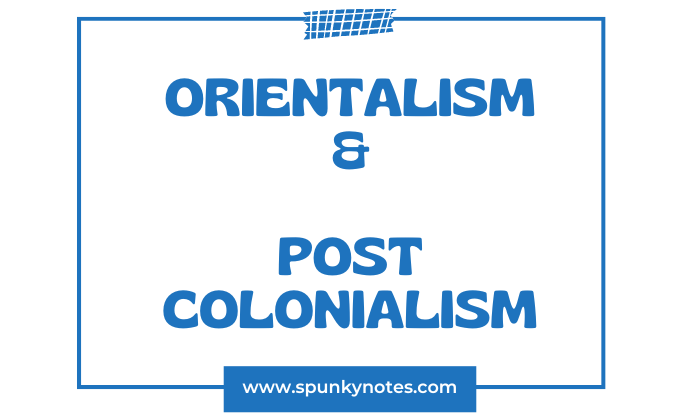
Q. Discuss the role of Orientalism in the development of postcolonial studies. How is it helpful to understanding postcolonial societies?
Introduction to Orientalism and Post Colonialism
Orientalism, a concept introduced by Edward Said, plays a crucial role in post-colonial studies. It helps us understand how Western views shaped the image of Eastern societies.
Orientalism is like a lens that shows Eastern societies in a stereotyped and often unfair way. For example, movies depicting the Middle East as unfamiliar and mysterious reflect Orientalist thinking.
On the other hand, postcolonialism studies what happens to countries after they stop being colonies. It examines how colonial rule has left lasting impacts.
A good example is how English remains a primary language in many African countries, a remnant of British colonialism. Both Orientalism and post colonialism help us understand the profound effects of colonial history on cultures and societies.
Breaking Down Stereotypes
Orientalism showed how the West often viewed Eastern societies in a stereotyped way. These views were not just wrong; they affected how colonized people saw themselves and their culture. Post-colonial studies use this idea to see how these stereotypes still influence people today.
Stereotypes are oversimplified ideas we have about others. Orientalism, for example, often shows Eastern cultures as mysterious or backward. Think of how movies sometimes portray Asian characters as martial arts experts or mystical figures – that is a stereotype.
Breaking down these stereotypes means challenging and questioning them. For instance, when authors from the Middle East write books about their natural, everyday lives, it helps break the stereotype that life is always about conflict or fairy tales.
Similarly, in post-colonial studies, challenging stereotypes can involve showing the diverse and modern aspects of African or Asian societies.
It counters the idea that they are always traditional or underdeveloped. It is about seeing and showing people and cultures as they are, not just as straightforward labels. Breaking down stereotypes is crucial in post-colonial studies.
Take, for example, the stereotype that African countries are underdeveloped. This idea often ignores the impact of colonial exploitation and the complex realities of these countries today.
Post-colonial studies challenge such stereotypes by highlighting these nations’ historical context and current achievements.
Another example is the portrayal of India in Western media. It is always shown as either extremely poor or exotically spiritual.
It overlooks the country’s diversity, technological advancement, and cultural richness. Post-colonial studies question these one-dimensional views and show a fuller picture of life in former colonies.
Western Power
Orientalism helps us understand the power the West had over the East. It was not just about ruling lands but also about controlling people’s thoughts.
Post-colonial studies examine how these power plays still affect former colonies, shaping their politics, culture, and how they see themselves.
Cultural Identity and Resistance
In post-colonial studies, Orientalism helps us see how people in former colonies react to Western views. Some reject these views, while others might accept them.
This tension is a big part of what post-colonial studies explore. It shows how cultural identity is complex and often reacts to colonial history.
Critiquing Historical Narratives
Orientalism encourages questioning historical narratives. In post-colonial studies, this means looking closely at history and asking, “Whose story is this?”
It makes us think about who wrote the history books and why. This critique is essential in understanding post-colonial societies, as it helps uncover hidden stories and perspectives.
Influencing Literature and Art
Orientalism has significantly impacted literature and art in post-colonial societies. Writers and artists often respond to Orientalist stereotypes in their work.
They use their art to tell stories and show their cultures’ real faces. This creative response is a crucial area of interest in post-colonial studies.
For instance, in literature, authors like Chinua Achebe challenged Orientalist stereotypes. Achebe’s “Things Fall Apart” counters the image of Africa as ancient by depicting a complex, traditional Igbo society.
Orientalism in the Modern World
Finally, Orientalism helps us see how the past still affects the present. In post-colonial studies, we use it to understand current issues in former colonies. It shows us that the effects of colonial rule are long-lasting and can be seen in everything from politics to how people interact.
1- Media Representation
The media often portrays Eastern countries using Orientalist tropes. For example, news about the Middle East might focus heavily on conflict or extremism, neglecting the region’s diversity and cultural richness. This perpetuates a one-dimensional, often negative image.
2- Cultural Stereotypes
In movies and TV shows, characters from the East are sometimes still shown as unfamiliar or mysterious, reinforcing outdated stereotypes. This affects how people in the West perceive these cultures and their people.
3- Political Discourse
Orientalist ideas can be seen in political discussions about immigration, foreign policy, and international relations. Eastern nations are often discussed, emphasizing difference and otherness, which can influence policy and public opinion.
In summary, Orientalism is a foundational concept in post-colonial studies. It helps us understand the lasting impact of colonial rule on societies.
By studying Orientalism, we learn about the power of stereotypes, cultural identity, historical narratives, and colonialism’s ongoing influence in today’s world.

